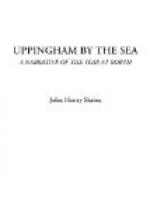Ah! kind friend, you showed us the sincerest of flatteries, that of imitation. You left a comfortable home for chance quarters and uncertain fare, that you might be one of us, an outcast among outcasts. Now we must part, for our home will spare us no longer, as neither will yours spare you. And so the last good-bye is said, and you are limping away to your hills again, with dejection expressed in every fibre of your frame, from the drooping ears to the last hair on your tail.
All is over, and the place is very silent, except for the clink of hammers where they are breaking down our wooden walls, and, seaward, the cry and splash of gull and tern dipping for their prey in the shoal of herring-fry which is wandering about the bay. Close inshore a porpoise is wallowing, like the jolly sea-pig that he is, in his berth of glistening water. The wild creatures seem to have grown tamer since there are no strollers to keep them aloof. This morning, as we passed his pool, the stately heron let us come within twenty yards of him before he got leisurely upon the wing. The village seems even quieter; the people at their doors betray, to our fancy, a certain lassitude as if, like merrymakers on the morrow of a revel, they felt somewhat sleepy and sorry, now that the stirring social year is over, and the little fishing town has returned to its “old solitary nothingness.”
Yes, the silence has come down again; but it is a silence full of voices. For, as it often happens that, when things without are stillest, men hear most audibly the tumult of their own brains, so is it now with us. Action is ended, and memory begins to work. Into the vacuum which the silence makes, the stream of our little history pours in a long backwater. Our thoughts go back to the beginning of it, the hour when, as we were sailing prosperously under press of canvas, the blast struck us suddenly out of a sunny sky. We live again the slow months of enforced vacation, and the brief spell of apparent security, broken by the second stroke. We recall the slow and painful sickening of hope, amid the frustration of attempted remedies; the watchings and communings by late firesides; the morning questionings and bulletins; the deepening of fears, until the moment when the sharp pressure of calamity became the liberating touch, and made a hazardous adventure seem a welcome alternative. Not less distinctly we remember the zest with which the wretched waiting for evil tidings was exchanged for hopeful activity; the rush of preparations; the anxiety which watched their passage through the ordeal of practice; the growing sense of security; the mellowing down of novelty and privation into routine and ease; the contrast, all the while, between the outward peace of the colony, and the secret difficulties of finance and commissariat; the long intermittent crisis which gave the administrative no rest; the hopes and efforts for our return home, and the reversal of them; all this, and—and—very much else as well, which was of acutest interest at the time, and which it will become convenient to describe only when it will be of interest to no one. All this passes before us in the series of a long dissolving view, full of bright lights, and only less full of unlovely shadows.




